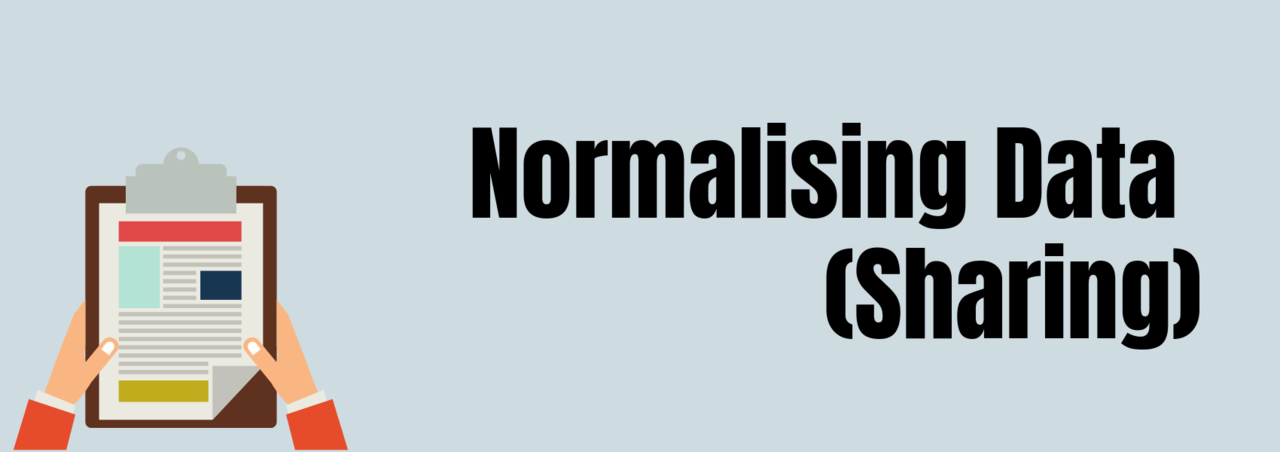Open Data with Zürich Tourism
The city of Zurich published data sets of attractions, destinations, restaurants and accommodation that can be freely reused under a CC BY-SA license.
Send us a link
The city of Zurich published data sets of attractions, destinations, restaurants and accommodation that can be freely reused under a CC BY-SA license.
Can journals help to “protect” the scientific community and the public from unscrupulous reanalysis of data?

Open science will make science more efficient, reliable and responsive to societal challenges. The European Commission has sought to advance Open Science policy from its inception in a holistic and integrated way, covering all aspects of the research cycle from scientific discovery and review to sharing knowledge, publishing and outreach.
The Beijing Declaration is intended as a timely statement of core principles to encourage global cooperation, especially for public research data.
This article discusses how data citation has evolved over the last couple of decades and highlights issues that need more research and attention.
Inspired by the University of Cambridge Data Champion programme, we have built a community of Data Champions to advocate for good research data management (RDM) practice within all university faculties at TU Delft. Currently, we have 47 active members and the number is increasing.
Everything we have gained by opening content and data will be under threat if we allow the enclosure of scholarly infrastructures. We propose a set of principles by which Open Infrastructures to support the research community could be run and sustained.

Researchers share tips for transforming your group with open data science and teamwork.
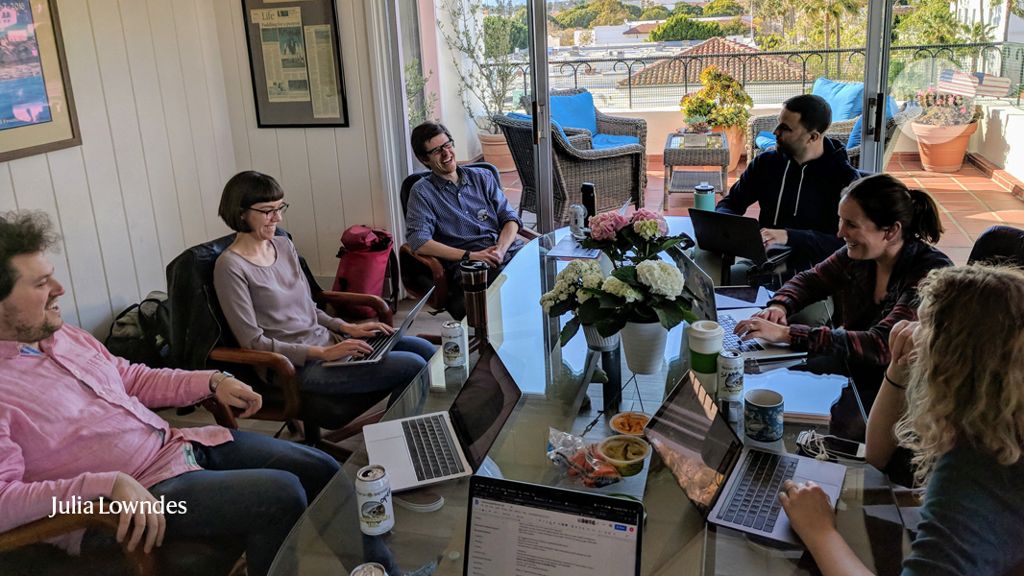
Iain Hrynaszkiewicz, Publisher, Open Research, PLOS Note: the following perspective was published as part of Digital Science's annual survey and report, The State of Open Data 2019 , to coincide with global celebrations around Open Access Week. The biggest barrier to research data sharing and reuse seems to be a matter of trust, and in particular trust in what others may do with researchers' data if it is made openly available. The 2019 State of Open Data survey revealed that more than 2,000 respondents had concerns about misuse of their research data. Concerns about data misuse represent a multitude of issues; fears that errors could be found in their work, or that the data could be misinterpreted or research participant privacy be compromised. Researchers might also be concerned that their data will be reused for purposes they did not intend, such as commercial exploitation, or for misleading or inappropriate secondary analyses.1 The 2019 survey provides insights from one of the
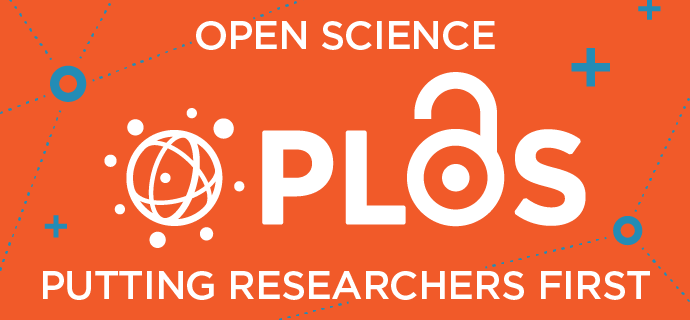
The State of Open Data 2019 report is the fourth in the series and includes survey results and a collection of articles from global industry experts.It is now the longest running longitudinal study on the subject, which was created in 2016 to examine attitudes and experiences of researchers working with open data - sharing it, reusing it, and redistributing it. This year's survey received a record number of survey participants with around 8,500 responses from the research community. While most trends are encouraging around the adoption and acceptance of open data, the research community is now demanding more enforcement of the mandates that have been adopted by many governments, funders, publishers and institutions around the world.The majority of researchers want funding withheld and penalties for a lack of data sharing.

Figshare has launched its annual report The State of Open Data 2019. While most trends are encouraging around the adoption and acceptance of open data, the research community is now demanding more enforcement of the mandates that have been adopted by many governments, funders, publishers and institutions around the world.
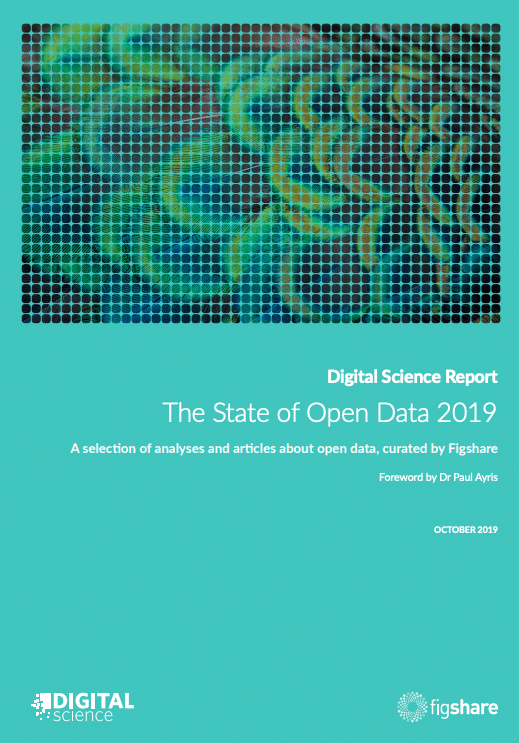
In a crowded and confusing landscape for research data preservation and sharing, two fundamentally competing visions are emerging. Which will win?

Sharing research data is increasingly becoming a real business. Today, we provide an overview this landscape and highlight several recent announcements that may indicate future strategic prospects.

A new report summarises the results of a survey of European research funders on Open Access and Research Data policies, commissioned by SPARC Europe.
Transparent evaluations of FAIRness are increasingly required by a wide range of stakeholders, from scientists to publishers, funding agencies and policy makers. We propose a scalable, automatable framework to evaluate digital resources that encompasses measurable indicators, open source tools, and participation guidelines, which come together to accommodate domain relevant community-defined FAIR assessments. The components of the framework are: (1) Maturity Indicators - community-authored specifications that delimit a specific automatically-measurable FAIR behavior; (2) Compliance Tests - small Web apps that test digital resources against individual Maturity Indicators; and (3) the Evaluator, a Web application that registers, assembles, and applies community-relevant sets of Compliance Tests against a digital resource, and provides a detailed report about what a machine "sees" when it visits that resource. We discuss the technical and social considerations of FAIR assessments, and how this translates to our community-driven infrastructure. We then illustrate how the output of the Evaluator tool can serve as a roadmap to assist data stewards to incrementally and realistically improve the FAIRness of their resources.
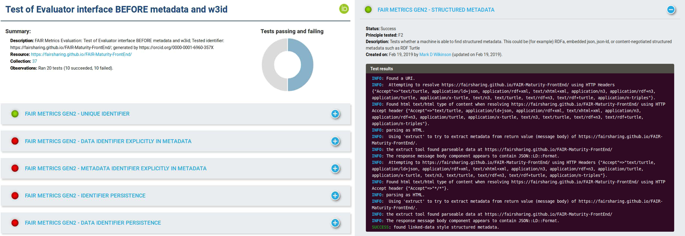
OASPA is pleased to publish this guest post on the subject of open data and data sharing, providing helpful practical advice drawn from a wealth of resources, to enable publishers and editors to play a key role in the important movement to make data accessible.
Collaboration brings together leading platforms for data and software sharing.

Efforts to make research results open and reproducible are increasingly reflected by journal policies encouraging authors to provide data availability statements. As a consequence of this, there has been a strong recent uptake of data availability statements, but it is still unclear what proportion of these statements actually contain well-formed links to data, and if there is an added value in providing them.
Interactive and reproducible repositories powered by Zenodo and Binder.

The goal of the Open Science Graphs Interest Group (OSG IG) is to build on the outcomes and broaden the challenges of the Data Description Registry Interoperability (DDRI) and Scholarly Link Exchange (Scholix) RDA Working Groups to investigate the open issues and identify solutions towards achieving interoperability between services and information models of Open Science Graph initiatives.
To promote effective sharing, we must create an enduring link between the people who generate data and its future uses, urge Heather H. Pierce and colleagues.

Do Swiss researchers share their data with other researchers and with the public? And if not, why? Which data repositories and other channels do they use for data sharing? A large-scale survey by the SNSF and swissuniversities offers some answers.

I attended csv,conf,v4 in Portland, Oregon in May 2019. Here are a few reflections about the conference and a bit about my talk where I shared progress from the Openscapes Champions.
Open science can lead to greater collaboration, increased confidence in findings and goodwill between researchers.

Introducing Five Essential Factors, our latest white paper. Over the past two years, we've heard from more than 11,000 researchers about their views on data sharing, what they do in practice and the challenges they face. Building on that understanding, today we have released a whitepaper which proposes five key factors to make data management and sharing "business as usual" for all researchers.
